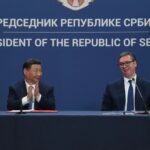- New government composition approved in Serbia
A total of 152 deputies in the People’s Assembly of Serbia out of 213 supported the country’s new government led by Miloš Vučević, leader of the Serbian Progressive Party (SNS). At the same time, 61 lawmakers stood against the motion with no abstentions registered in the session hall.
As Vučević noted, “this government will face serious and far-reaching foreign policy challenges from the first days of its mandate,” and, in his opinion, “in this sense, the biggest challenge in the short term will be, without a doubt, the protection of the country’s sovereignty and territorial integrity, that is, the struggle for Kosovo and Metohija”.
The new head of government in his address to parliament emphasized that the “two cornerstones” of foreign policy are “political independence and military neutrality.” Full membership in the EU remains Serbia’s strategic priority, he noted. At the same time, according to Vučević, Serbia will not give up friendship with Russia, whose people Serbia considers fraternal. He added, however, that the same applies to Ukraine and the Ukrainian people. “We clearly condemned Russia’s attack on Ukraine, but we also expressed our disagreement with the policy of sanctions against the Russian Federation, which we neither want nor will we join it,” he emphasized.
Observers have already noted that the composition of the new government of Serbia suggests its pro-Russian and anti-Western stance. Certain appointments were the main reason behind these conclusions.
U.S.-sanctioned Aleksandar Vulin, who at one time headed the Ministry of Defense, Internal Affairs and, until November last year, the Security Information Agency (intelligence), became Deputy Prime Minister. He is considered the champion of promoting Kremlin’s interests in the Balkans.
Milica Djurdjevic Stamenkovski, the leader of the openly pro-Kremlin party Zavetnici, has been appointed as the Minister for Family Affairs and Demography.
Nenad Popovic, who has been sanctioned by the U.S. government and headed Serbia’s observer mission at the Russian presidential election in 2024, was appointed minister without a portfolio.
- Updated draft Resolution on Srebrenica filed with UN General Assembly
After several rounds of inclusive consultations, the updated draft resolution on the establishment of an international day of remembrance of the genocide in Srebrenica was tabled in the UN General Assembly.
On May 1, the Permanent Representative of Bosnia and Herzegovina to the UN, Zlatko Lagumdžija, noted that the document was handed over to the President of the General Assembly and all permanent missions to the UN.
The agreed text of the Resolution declares that July 11 be annually observed as the International Day of Remembrance and Commemoration of the 1995 Srebrenica Genocide.
The text of the Resolution condemns any denial of the genocide in Srebrenica, and calls on UN member states to preserve established facts by developing appropriate educational programs to prevent denial and distortion of information about the genocide in the future.
The Resolution also condemns actions that glorify those found guilty of war crimes, crimes against humanity, and genocide by international courts, including those responsible for the genocide in Srebrenica.
The resolution also emphasizes the importance of completing the process of finding and identifying the remaining victims of the Srebrenica genocide and calls for the continued prosecution of those perpetrators of the Srebrenica genocide who have not yet been brought to justice.
Despite the humanitarian nature of the Resolution, the leadership of Serbia and Republika Srpska keeps reiterating the claim that it is directed against Republika Srpska and all Serbs, and that its adoption will lead to an aggravation of the situation in Bosnia and Herzegovina and the region.
- Montenegro wants no beef with Serbia over UN Resolution
Montenegro will support the UN Resolution on Srebrenica, but will not become its co-author, Prime Minister Milojko Spajic said.
The Ambassador of Serbia to Bosnia and Herzegovina, Ivan Todorov, said that Montenegro, by announcing that it will vote for the resolution on Srebrenica in the UN General Assembly, demonstrated, first of all, irresponsibility towards the Serbian people in Montenegro.
Republika Srpska President Milorad Dodik called the decision “morally, politically, and historically catastrophic” and labeled the Montenegrin government anti-Serbian.
Trying to send a friendly pro-Serbian message, the Montenegrin government filed two amendments to the Resolution.
The First Amendment states that guilt for the crime of genocide is individual and shall not be attributed to any ethnic, religious, or other group or community as a whole. In this way, the Montenegrin government officials seek to refute the accusations from Serbian politicians regarding the intention to declare the Serbs a genocidal people. The second amendment confirms the inviolability of the Dayton Agreement – the general framework peace agreement for Bosnia and Herzegovina, which corresponds to the Serbian position.
- Montenegro mulls compensation to victims of NATO bombing
On April 30, the 25th anniversary of the NATO bombing that killed six civilians, including three children, commemorative events were held in the village of Murino in northern Montenegro.
President of Montenegro Jakov Milatovic and Speaker of Parliament Andrija Mandic laid wreaths at the monument of the victims.
President Milatovic appealed to the parliament and government to adopt a law on compensation to the victims’ families as soon as possible. “Let’s pay back at least to such a small extent and at least slightly correct the injustice that has existed in our state for the past 25 years,” he said.
Prime Minister Milojko Spajic wrote on X: “After 25 years, the government will pay compensation to the victims’ families. …Our duty is not to discriminate between victims, but to treat everyone equally, because this is the only way to a true civil state in which no one is neglected,” he said.
The change in Montenegrin policy towards NATO bombing demonstrates Podgorica’s desire to synchronize its policy with Belgrade, despite Montenegro’s membership in NATO.
- British politicians want to see London’s more active participation in maintaining peace in Western Balkans
The UK has no plans to join the EU’s EUFOR Althea military mission in Bosnia and Herzegovina. This was stated by the Parliamentary Under-Secretary of State for Foreign Affairs, David Rutley, during a debate in the lower house of the British Parliament on security in the Western Balkans.
Instead, the UK continues to support the armed forces of Bosnia and Herzegovina, as evidenced by the deployment of the 1st Battalion of the Royal British Regiment to train alongside BiH armed forces in October and November last year, he noted.
At the same time, the deputies suggested increasing the British contribution to peacekeeping in BiH through military presence.
During the discussion, the head of the Committee on Foreign Affairs, Alicia Kearns, emphasized that the Western Balkans could become the site of the third major global conflict, along with Ukraine and Gaza if no preventive measures are taken. She urged the government to work with allies to consider an alternative NATO-led peacekeeping mission to EUFOR. The Dayton Agreement gives NATO a clear authorization to legally establish peacekeeping forces in Bosnia without time limits or UN approval, she noted, which means that neither Milorad Dodik nor Vladimir Putin can block it, unlike the current arrangement for EUFOR. At a minimum, the United Kingdom should send NATO peacekeeping forces to the strategic area of Brcko, Kearns suggested, adding that even a single battalion of NATO troops in Brcko would make secession impossible from a military standpoint and have a stabilizing effect on the entire politics in BiH, the head of the Committee emphasized.
The ex-commander of a British battalion of UN peacekeeping forces in Bosnia in 1992 and 1993, now an independent member of the British Parliament, Bob Stewart, said that a British battalion would be the best battalion to send to south-east Europe to help maintain peace.
After the discussion, the lawmakers adopted a resolution which recognized the worsening security situation in the Western Balkans, supported the territorial integrity and sovereignty of Kosovo and Bosnia and Herzegovina, and called on the government to strengthen cooperation with regional partners and international allies to improve the security landscape in the Western Balkans.
The debate in the British Parliament became another proof of the more active involvement of British politicians in maintaining peace in the Western Balkans. Although the UK government is currently avoiding radical moves such as the creation of an alternative to EUFOR in the event of a deterioration of the security situation in the region, the option may be on the table.
- Serbia marks anniversary of shooting rampage at Belgrade school
On May 3, in Serbia, several commemorative events with the participation of the top officials honored the memory of the victims of the mass murder at the Vladislav Ribnikar elementary school in Belgrade.
A year ago, a 13-year-old student shot dead nine of his classmates and a security guard. Overnight May 5, there was another massacre in the neighborhood, where more people, mostly youths, were killed.
The tragedies sparked a wave of civil protests – tens of thousands of people took to the streets of Belgrade and other cities across Serbia, demanding an end to violence in public space, politics, and media. The absolute majority of demands were never satisfied.
Feeding off the protest movement, the political bloc Serbia Against Violence was created, joined by the leading opposition parties. After the elections on December 17, 2023, the Serbia Against Violence movement made it to parliament but failed to gain a majority of votes for changing the power.
- Balkan drug mafia creates most extensive cocaine supply chain in Europe
Reuters published an investigation about the Balkan drug mafia, which, according to the testimony of law enforcement operatives from the Americas and Europe, is currently the leader in terms of drug supplies to European countries.
“When we talk about large-scale shipments to supply the European continent, the only group that’s hegemonic is the Balkans,” journalists quoted a Brazilian federal police detective as saying.
“Balkan fingerprints can now be found on most of the cocaine that enters Europe each year, U.S. and European counter-narcotics officials said. The Maritime Analysis and Operations Centre, a European agency that coordinates narcotics busts in Atlantic waters, said a record 9.11 metric tonnes of cocaine linked to Balkan criminals was seized at sea last year, a 300% increase since 2015,” the report reads.
Among the main targets of the inquiry are Serbs, Montenegrins, and Macedonians.
It is obvious that the development of criminal networks in the Balkan countries creates a favorable environment for maintaining a high crime rate in the region and ensuring a constant flow of shadow money, which contributes to corruption and the purchase of political influence. Without analyzing these factors, it is impossible to fully assess the political landscapes of the Balkan nations.



